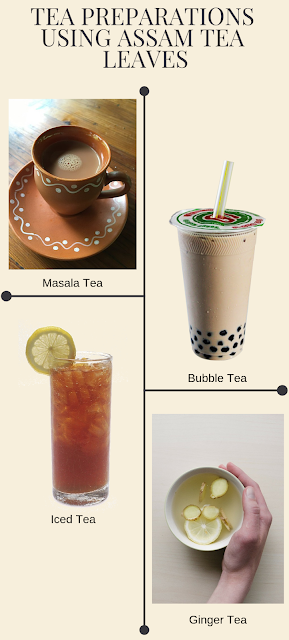Assam is the
largest producer of tea leaves in India with approximately 52% of the total tea
coming from this country. Assam tea is essentially a black tea that is recognized by its
distinctive malty taste. As a matter of fact, Assam tea has assumed the
identity of a brand across the world. The first word after you hear ‘black tea’
tends to be Assam tea. This is due to the fact that it has garnered so much
popularity and attention over the years.
Let’s Explore the Famous Tea Gardens of Assam!
Assam tea gardens are known to produce
a signature blend of brisk and malty flavours in the tea leaves. Furthermore,
this dark liquor is now one of the ideal choices of a breakfast beverage. Not
only this, you can make various tea preparations using Assam tea leaves.
All credit must go to the tea gardens and workers that gave us the luxury of
experiencing pure bliss from a cup of tea.
 |
| Some Tea Preparations Using Assam Tea Leaves |
While a tea
garden sounds like a small plot of land, it is just the opposite. Each tea
garden contains its own processing factory, tea growing area, forest land,
water supply, management and labour force. Tea gardens are actually massive in size.
More than 100 tea estates have their gardens in Assam such as Halmira, Ambika,
TATA, and many more.
Climate of Tea Gardens
Situated near
the Brahmaputra river, Assam tea gardens are exposed to specific climatic
conditions that mould its flavour and taste. These tea gardens are subjected to
the following conditions:
- During monsoon, Assam regularly accounts for over 10 inches of rainfall per day
- Daytime temperature rises as high as 36° C, producing extreme heat and humidity
Assam
experiences heavy rainfall and humid atmospheric conditions throughout the
year. No other region can replicate these conditions, which partly explains why
Assam tea leaves are always in high demand.
 |
| A Tea Garden |
Harvesting in Tea Gardens
The harvesting
of Assam tea leaves is typically
done twice a year. The first harvest, or Spring flush, happens from March while
the second flush, or Spring flush, happens from August. It is the second flush
that is known to produce the famous ‘Tippy teas’ of Assam. It is called so due
to the golden tips that are present on the leaves (that produces a fuller body
and sweeter flavour).
The people who
work in these tea gardens are well-experienced in their fields. Each tea leaf
is plucked by hand and put into baskets or sacks. The workload increases when
the second flush draws closer. During the second flush, the day the leaf is
plucked is the same day it has to be made into tea. Furthermore, within the
next 24 hours, it has to be sorted into varying tea leaf grades.
These are the
main steps in processing the tea leaves:
- Withering
- Rolling or CTC
- Oxidation
- Drying
- Sorting
Tea tourism
The lush
greenery and pleasant climate of Assam offers a peaceful atmosphere to local
residents as well as outsiders. To promote the concept of tourism in Assam,
certain initiatives were taken. The Assam tea festival in November is one such
effort where everyone gets the chance to enjoy the sights that Assam has to
offer.
There are
bungalows rented out to guests so that they can also get the rejuvenating
experience of Assam. Banyan Grove on Gatoonga Tea Estate (near Jorhat) is a
reputed place for visitors to stay. People are allowed to interact with the
workers and can get first-hand experience on how the tea is produced
step-by-step.
One can also
be a part of the tea-tasting process to understand how authentic Assam tea
tastes. Visitors can also visit the factories and see the entire process for
themselves. With tours of the magnificent tea gardens and fantastic river
cruises, you will surely want to make Assam your next travel destination.
Apart from health benefits, Assam tea leaves have a lot of heritage
and significance attached to them. Beginning from the origin of the leaf in tea
gardens to the exact effect of humidity and precipitation, the countless hours
of labour, the various types of processes incurred, and the tea-tasting portion
- all these have influences on the tea you drink every day without even
realizing.
Very interesting post. As I am big fan of Assam tea so that I really enjoyed the
ReplyDeletearticle. I always used to buy Premium Assam Tea
.